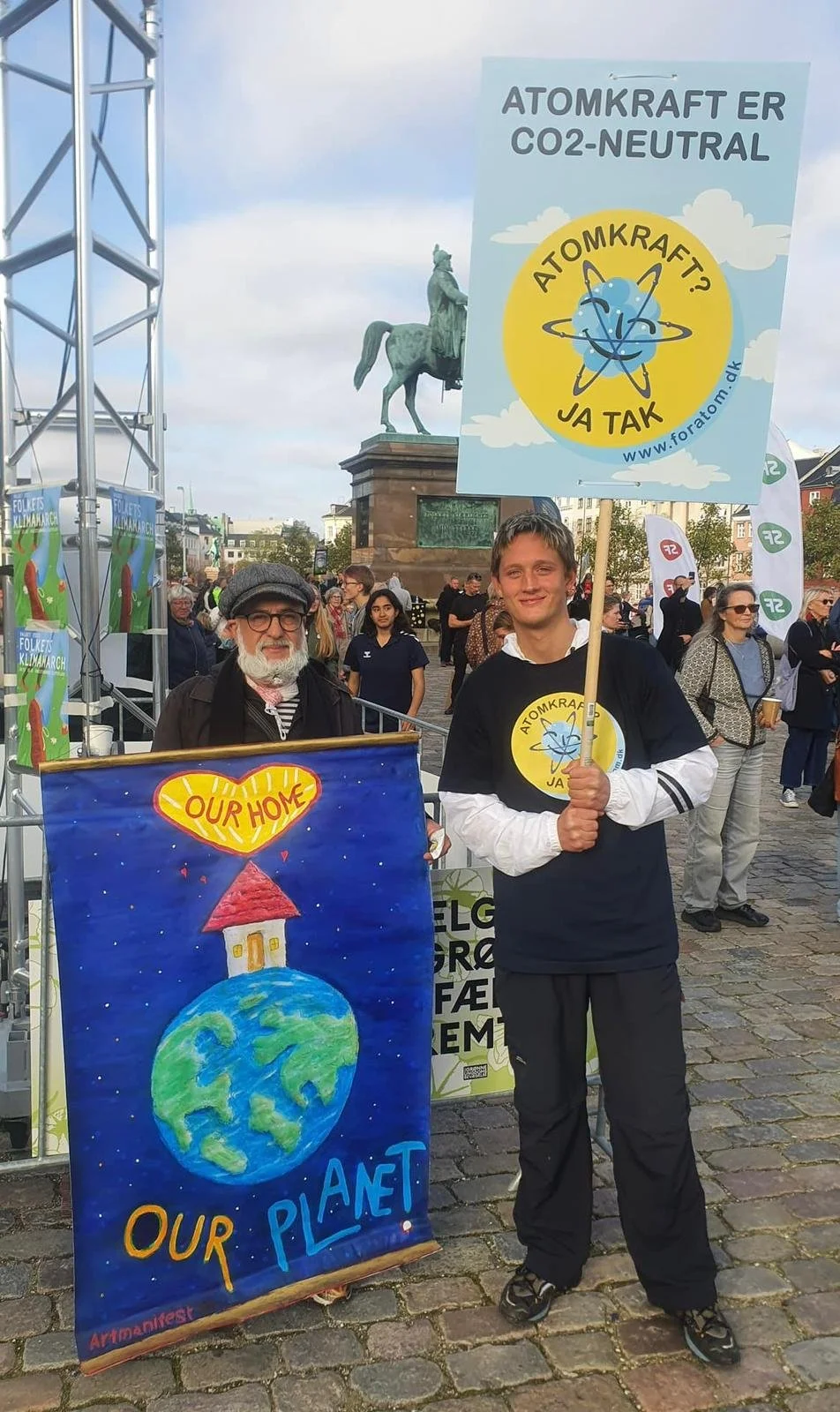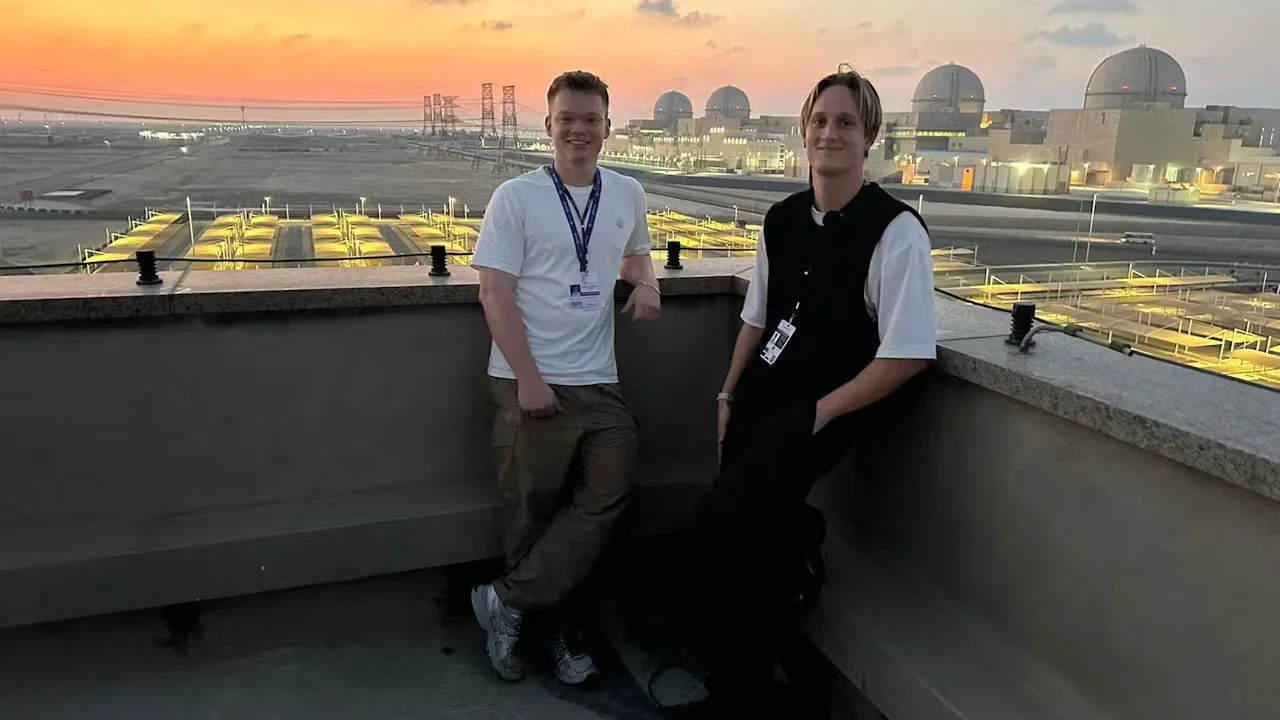Jens Høj Christiansen, Westinghouse Reactor Physicist, Atomkraft Ja Tak Nuclear Advocate, January '26
Meet the Reactor Physicist and Nuclear Advocate Born in the Anti-nuclear Epicenter
Westinghouse reactor physicist intern Jens Høj Christiansen emerged as a leading proponent for nuclear energy within Denmark over the past several years as an analyst and speaker with Foreningen Atomkraft Ja Tak, an organization dedicated to educating the public and repealing Denmark’s ban on nuclear energy.
Founded by Johan Sollid during the COVID pandemic in 2020, Atomkraft Ja Tak has played a key role in shifting public opinion on nuclear energy. Denmark displayed the greatest shift in public opinion on nuclear energy in Europe from 2021 to 2024, with a 46% increase in support.
The famous anti-nuclear logo that emerged out of Aarhus, Denmark. In Danish, the smiling sun says “Nuclear energy? No thank you.”
In Denmark, being pro-nuclear was taboo, especially in Christiansen’s native Aarhus, the birthplace of the “Nuclear power, no thank you!” logo. According to Christiansen, the long-running anti-nuclear sentiment in history was a strong part of people’s identities. People who favored nuclear received shame - Christiansen said he experienced bitterness and attacks when he first started advocating with Atomkraft Ja Tak at climate action demonstrations.
One of the key roles that Atomkraft Ja Tak plays, Christiansen said, is providing space for nuclear proponents, where they feel comfortable voicing their opinion. The organization created an argument bank, with common anti-nuclear arguments debunked in easily understandable language backed with scientific sources.
“I got really like, shamed and verbally attacked, and people got really nasty and angry. But one of the huge impacts that I think our organization had is that we sort of acted like this big brother for people,” Christiansen said. “We were very proud and not backing down, even though we got attacked a lot. I think that sort of sparked a lot of courage in other people. These young people are fighting and backed by science. That definitely gave people confidence to sort of stand their ground in this. Suddenly, it wasn't as controversial anymore.”
Christiansen did not always have his pro-nuclear convictions. Growing up in Aarhus, he said he was “born into” anti-nuclear ideology by default. In 2020, Christiansen was engaged with the green transition and climate issues, going vegan and participating in demonstrations and climate action centered around reforming animal agriculture. He became a vocal proponent of preserving biodiversity and large natural areas.
While studying physics as an undergraduate at Aarhus University, Christiansen met the founders of Atomkraft Ja Tak, who inspired him to dig into nuclear energy. As he dove down the “enormous rabbit hole that is nuclear energy,” from political, economic, and technological perspectives, Christiansen began to support nuclear energy.
One of the breakthrough moments for Christiansen came when he recognized that wind and solar energy only comprised 10% of the Danish energy system, despite their seeming omnipresence in the country. At the time, in 2020, Christiansen was involved in the green transition and climate issues, but largely focused on renewables.
In 2021, Christiansen started volunteering with Atomkraft Ja Tak, producing material for public speaking and education around the country, particularly highlighting the physics material surrounding the Danish energy system.
One of the strengths of the organization, according to Christiansen, is the diversity of backgrounds. Among occupations, musicians, physicists, political scientists, artists, and electricians comprise Atomkraft Ja Tak.
Physics colors how Christiansen views nuclear energy; he said it gives him a deep understanding of the mechanisms involved, which takes away much of the fear of the technology. Always interested in physics and how the universe works from a young age, Christiansen found a practical application of physics when he became passionate about the green transition, and could work on energy, climate, and sustainability.
Christiansen manning an Atomkraft Ja Tak booth, aimed at engaging with the public on nuclear energy at a political festival in Denmark.
Christiansen hopes to make a meaningful impact in the nuclear field as a reactor physicist. As an intern at Westinghouse, he supports reactor simulations and gets to work alongside nuclear experts. His colleagues have contributed to strong reactor performance and rising capacity factors, including improvements seen at the Callaway nuclear plant.
“Some of the people that I work with have four plus decades of experience in the nuclear industry, and have sort of helped pioneer modern reactor physics,” Christiansen said. “Some of these guys are, I would say, actual legends. They played a key role in how we have sort of optimized reactors to run better over the years. A lot of it has to do with better calculation tools and ingenious physics that have helped us operate these reactors even better.”
Christiansen hopes to become a key part of the Danish nuclear industry, either developing new fuels, new reactors, or refining existing reactors and optimizing existing reactors. For that to happen, Denmark needs to remove the ban on nuclear energy, put in place by Danish Parliament in 1985 and 1997. Westinghouse could lead a nuclear buildout, Christiansen said, building off their current experience building new reactors in Poland and Bulgaria.
For Christiansen, Denmark’s voyage into nuclear energy has implications for all of European energy policy, because for decades the country has pressured the rest of Europe not to use nuclear energy. Atomkraft Ja Tak seeks to publicly speak, educate, and advocate for nuclear, relying on scientific sources like the International Atomic Energy Agency, the IPCC, the UN Climate Committee, and “let the numbers speak for themselves”, Christiansen said.
Fellow members at Atomkraft Ja Tak inspired Christiansen to embark on his nuclear journey, and their brilliance and dedication continue to motivate him. He said he also has followed Stand Up for Nuclear’s campaigns to save nuclear plants around the world, inspired by a small group of people making an “enormous” impact on an international stage.
As a global nuclear advocate, Christiansen attended COP 28, Nuclear Climate Week, and the Brussels Nuclear Energy Summit in 2024. In Denmark, Christiansen regularly speaks at political festivals. At this year’s political festivals in Denmark, Jens Høj Christiansen witnessed a striking shift in public and political attitudes toward nuclear energy. Unlike previous years, he encountered no negative discussions—most attendees were either supportive of lifting Denmark’s nuclear ban or curious and open-minded. Even longstanding anti-nuclear groups like Greenpeace offered little resistance, Christiansen said, marking a turning point where nuclear advocacy in Denmark is no longer an uphill battle.
Christiansen and the founder of Atomkraft Ja Tak, Johan Sollid, at Barakah Nuclear Plant in the UAE, while advocating for Danish nuclear as part of COP 28 in Dubai.
Christiansen and his fellow advocates have made progress. The government announced in May 2025 that it is considering lifting its ban on nuclear energy and will analyze the benefits of a new generation of nuclear reactors. A government stance like this just a couple of years ago was “completely unimaginable”, Christiansen said.
Many people in Denmark have also told members of Atomkraft Ja Tak that they are grateful for the energy education they provide and that it is because of their work that they changed their mind about nuclear energy..
For Christiansen, nuclear is a necessary technology for sustainability, climate, and prosperity on a global scale.
Denmark was once a pioneer in nuclear research—with key figures like Niels Bohr and a world-class research center—but decades of neglect have left the country trying to rebuild an industry it once helped launch, underscoring the need for sustained public engagement, informed advocacy, and vigilance against misinformation. Much of Christiansen’s advocacy is centered on keeping the public informed.
“It's very important that we keep people informed and keep real knowledge in the public and not let misinformation and fear and false stories take over,” Christiansen said. “It’s the most promising technology for the future of energy, considering global scalability, sustainability, and affordability.”




